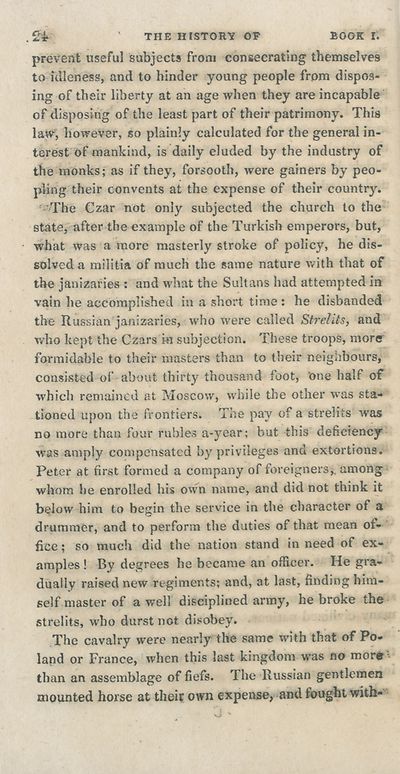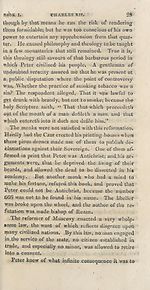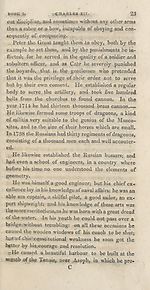Download files
Complete book:
Individual page:
Thumbnail gallery: Grid view | List view

£4 THE HISTORY OF BOOK I.
prevent useful subjects from consecrating themselves
to idleness, and to hinder young people from dispos¬
ing of their liberty at an age when they are incapable
of disposing of the least part of their patrimony. This
law, however, so plainly calculated for the general in¬
terest of mankind, is daily eluded by the industry of
the monks; as if they, forsooth, were gainers by peo¬
pling their convents at the expense of their country.
The Czar not only subjected the church to the
state, after the example of the Turkish emperors, but,
what was a more masterly stroke of policy, he dis¬
solved a militia of much the same nature with that of
the janizaries : and what the Sultans had attempted in
vain he accomplished in a short time : he disbanded
the Russian janizaries, who were called Strelits, and
who kept the Czars in subjection. These troops, merer
formidable to their masters than to their neighbours,
consisted of about thirty thousand foot, One half of
which remained at Moscow, while the other was sta¬
tioned upon the frontiers. The pay of a strelits was
no more than four rubles a-year; but this deficiency
was amply compensated by privileges and extortions.
Peter at first formed a company of foreigners,, among
whom he enrolled his own name, and did not think it
below him to begin the service in the character of a
drummer, and to perform the duties of that mean of¬
fice ; so much did the nation stand in need of ex¬
amples ! By degrees he became an officer. He gra¬
dually raised new regiments; and, at last, finding him¬
self master of a well disciplined army, he broke the
strelits, who durst not disobey.
The cavalry were nearly the same with that of Po¬
land or France, when this last kingdom was no mor#'
than an assemblage of fiefs. The Russian gentlemen
mounted horse at their own expense, and fought with-
prevent useful subjects from consecrating themselves
to idleness, and to hinder young people from dispos¬
ing of their liberty at an age when they are incapable
of disposing of the least part of their patrimony. This
law, however, so plainly calculated for the general in¬
terest of mankind, is daily eluded by the industry of
the monks; as if they, forsooth, were gainers by peo¬
pling their convents at the expense of their country.
The Czar not only subjected the church to the
state, after the example of the Turkish emperors, but,
what was a more masterly stroke of policy, he dis¬
solved a militia of much the same nature with that of
the janizaries : and what the Sultans had attempted in
vain he accomplished in a short time : he disbanded
the Russian janizaries, who were called Strelits, and
who kept the Czars in subjection. These troops, merer
formidable to their masters than to their neighbours,
consisted of about thirty thousand foot, One half of
which remained at Moscow, while the other was sta¬
tioned upon the frontiers. The pay of a strelits was
no more than four rubles a-year; but this deficiency
was amply compensated by privileges and extortions.
Peter at first formed a company of foreigners,, among
whom he enrolled his own name, and did not think it
below him to begin the service in the character of a
drummer, and to perform the duties of that mean of¬
fice ; so much did the nation stand in need of ex¬
amples ! By degrees he became an officer. He gra¬
dually raised new regiments; and, at last, finding him¬
self master of a well disciplined army, he broke the
strelits, who durst not disobey.
The cavalry were nearly the same with that of Po¬
land or France, when this last kingdom was no mor#'
than an assemblage of fiefs. The Russian gentlemen
mounted horse at their own expense, and fought with-
Set display mode to:
![]() Universal Viewer |
Universal Viewer | ![]() Mirador |
Large image | Transcription
Mirador |
Large image | Transcription
| Antiquarian books of Scotland > Kings & rulers > History of Charles XII, King of Sweden > (44) |
|---|
| Permanent URL | https://digital.nls.uk/115021538 |
|---|
| Description | Thousands of printed books from the Antiquarian Books of Scotland collection which dates from 1641 to the 1980s. The collection consists of 14,800 books which were published in Scotland or have a Scottish connection, e.g. through the author, printer or owner. Subjects covered include sport, education, diseases, adventure, occupations, Jacobites, politics and religion. Among the 29 languages represented are English, Gaelic, Italian, French, Russian and Swedish. |
|---|

